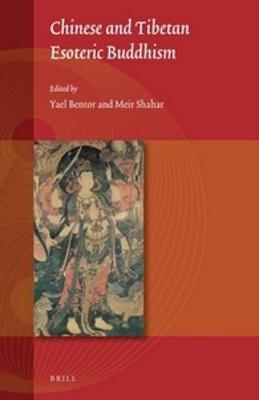
Chinese and Tibetan Esoteric Buddhism
Brill (Verlag)
978-90-04-34049-7 (ISBN)
Bringing together leading authorities in the fields of Chinese and Tibetan Studies alike, Chinese and Tibetan Esoteric Buddhism engages cutting-edge research on the fertile tradition of Esoteric Buddhism (also known as Tantric Buddhism). This state of the art volume unfolds the sweeping impact of esoteric Buddhism on Tibetan and Chinese cultures, and the movement's role in forging distinct political, ethnical, and religious identities across Asia at large.
Deciphering the oftentimes bewildering richness of esoteric Buddhism, this broadly conceived work exposes the common ground it shares with other Buddhist schools, as well as its intersection with non-Buddhist faiths. As such, the book is a major contribution to the study of Asian religions and cultures.
Contributors are: Yael Bentor, Ester Bianchi, Megan Bryson, Jacob P. Dalton, Hou Chong, Hou Haoran, Eran Laish, Li Ling, Lin Pei-ying, Lü Jianfu, Ma De, Dan Martin, Charles D. Orzech, Meir Shahar, Robert H. Sharf, Shen Weirong, Henrik H. Sørensen, and Yang Fuxue and Zhang Haijuan.
Yael Bentor, Ph.D. (1991), Indiana University, is Professor Emerita of Tibetan Studies in the Departments of Comparative Religion and Asian Studies at the Hebrew University of Jerusalem. She has published monographs, translations and many articles on Tibetan Buddhism, including The Essence of the Ocean of Attainments: Explanation of the Creation Stage of the Guhyasamāja, King of All Tantras, 2017. Meir Shahar Ph.D. (1992), Harvard University, is Professor of Chinese Studies at Tel Aviv University. His research interests span Chinese religion and literature, Chinese martial-art history, and the Sino-Indian cultural exchange. Meir Shahar is the author of Crazy Ji: Chinese Religion and Popular Literature; The Shaolin Monastery: History, Religion, and the Chinese Martial Arts; and Oedipal God: The Chinese Nezha and his Indian Origins.
List of Figures
Introduction
Part I: Chinese Perspectives on the Origins of Esoteric Buddhism
Chapter 1: Charles D. Orzech - Tantric Subjects: Liturgy and Vision in Chinese Esoteric Ritual Manuals
Chapter 2: Henrik H. Sørensen - Spells and Magical Practices as Reflected in the Early Chinese Buddhist Sources (c. 300–600 CE) and their Implications for the Rise and Development of Esoteric Buddhism
Chapter 3: Lü Jianfu - The Terms “Esoteric Teaching” (“Esoteric Buddhism”) and “Tantra” in Chinese Buddhist Sources
Part II: Chan, Chinese Religion, and Esoteric Buddhism
Chapter 4: Robert Sharf - Buddhist Veda and the Rise of Chan
Chapter 5: Lin Pei-ying - A Comparative Approach to Śubhakarasiṃha’s (637–735) “Essentials of Meditation”: Meditation and Precepts in Eighth Century China
Chapter 6: Meir Shahar - The Tantric Origins of the Horse King: Hayagrīva and the Chinese Horse Cult
Part III: Scriptures and Practices in the Their Tibetan Context
Chapter 7: Dan Martin - Crazy Wisdom in Moderation: Padampa Sangyé's Use of Counterintuitive Methods in Dealing with Negative Mental States
Chapter 8: Eran Laish - Perception, Body and Selfhood: The Transformation of Embodiment in the Thod rgal Practice of the “Heart Essence” Tradition
Chapter 9: Yael Bentor - Tibetan Interpretations of the Opening Verses of Vajraghaṇṭa on the Body Maṇḍala
Part IV: Tibetan Buddhism in China
Chapter 10: Shen Weirong - Ming Chinese Translations of Tibetan Tantric Buddhist Texts and the Buddhist Saṃgha of the Western Regions in Beijing
Chapter 11: Ester Bianchi - Continuities and Discontinuities in Sino-Tibetan Buddhism: The Case of Nenghai’s Legacy in the Contemporary Era
Part V: Esoteric Buddhism in Dunhuang
Chapter 12: Jacob Dalton - On the Significance of the Ārya-tattvasaṃgraha-sādhanopāyikā and Its Commentary
Chapter 13: Li Ling and Ma De - Avalokiteśvara and the Dunhuang Dhāraṇī Spells of Salvation in Childbirth
Part VI: Esoteric Buddhism in the Tangut Xixia and Yugur Spheres
Chapter 14: Hou Haoran - Notes on the Translation and Transmission of the Saṃpuṭa and Cakrasaṃvara Tantras in the Xixia Period (1038–1227)
Chapter 15: Yang Fuxue - Mongol Rulers, Yugur Subjects, and Tibetan Buddhism
Part VII: Esoteric Buddhism in the Dali Kingdom (Yunnan)
Chapter 16: Hou Chong - The Chinese Origins of Dali Esoteric Buddhism
Chapter 17: Megan Bryson - Between China and Tibet: Mahākāla Worship and Esoteric Buddhism in the Dali Kingdom
Index
| Erscheinungsdatum | 22.04.2017 |
|---|---|
| Reihe/Serie | Studies on East Asian Religions ; 1 |
| Verlagsort | Leiden |
| Sprache | englisch |
| Maße | 155 x 235 mm |
| Gewicht | 853 g |
| Themenwelt | Geisteswissenschaften ► Religion / Theologie ► Buddhismus |
| ISBN-10 | 90-04-34049-1 / 9004340491 |
| ISBN-13 | 978-90-04-34049-7 / 9789004340497 |
| Zustand | Neuware |
| Haben Sie eine Frage zum Produkt? |
aus dem Bereich


